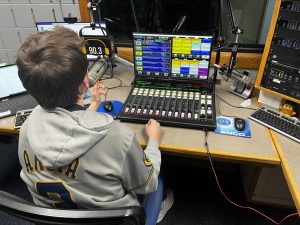WRST provides hands-on experience
February 16, 2022
The UW Oshkosh campus radio station, 90.3 WRST-FM Oshkosh, offers a breadth of opportunities and is always looking for new talent to help out.
Broadcasted from campus for more than 40 years, WRST is a non-commercial radio station located in the Arts and Communication building off Algoma Blvd.
With news reporting, live sports coverage, talk shows and station music monitoring being among the many ways a student can contribute to the radio station, there’s a little something for everybody to try out.
WRST Sports Director Calvin Leverenz said what started as a browse around the station turned into an instant connection with a staff member that was very welcoming and informative when he showed interest in working for the station.

WRST provides its students with lots of hand-on experience that they can take into their professional carreers or everyday life.Cory Sparks / Advance-Titan
WRST provides its students with lots of hand-on experience that they can take into their professional careers or everyday life.
“When I got here in the spring of 2020, I just walked up to the station to take a look at it,” Leverenz said. “It was super easy to get connected with the people there, and the sports director Adam Van Handel got me plugged in right away. I was involved in sports right away that spring with board [operations] and talk shows.”
Music Director Ryan Patton said he got his first glimpse of what it’s like to work on a radio station when it was a class requirement, and he never looked back from there.
He also added that the music present on the station is very tasteful and caught his ear immediately.
“Part of the class is to be an on-air host for most of the semester, and I was hooked as soon as my first shift was over,” Patton said. “The music that’s featured on the station is great, and music is one of my biggest passions.”
Leverenz said one unique aspect about radio is the heightened focus on diction and being well-spoken in general. He said that without any visuals to support what is being said, it is the job of the on-air personality to help the listener imagine an image through their descriptions.
“We’re painting a picture that can’t be seen,” he said. “In radio, our voice and sound is primary. So I feel like you can best perfect a craft for reporting, broadcasting and just talking in general when it’s done on the radio.”
WRST has the following executive board positions, although currently occupied, as opportunities for students: station manager, production manager, digital content creator, program director, music director, news director, sports director, promotions director and program assistant.
Executive board positions are paid at WRST, and Patton said once he learned that there was a vacancy in his area of interest, he jumped at the opportunity.
“When the music director position opened at WRST, I thought that going out and finding new music for the station is something I already do in my free time,” he said. “So [I figured] why not get paid to do it at WRST?”
Leverenz said he sees involvement in student media, no matter what form it may take, as a phenomenal portfolio-builder. He also said that there’s no shame in utilizing on-campus resources, like WRST, to test the waters.
“If you are involved at WRST, Titan TV or any other station, you’re going to learn how to use professional equipment and learn how to make professional broadcasts,” Leverenz said. “Being in an environment that is most like the professional world is going to make you most prepared for the professional industry.”
For those who don’t have a strong interest in having their voice heard on the air, there are plenty of other opportunities to contribute and Patton said that there is always room for behind-the-scenes contributions such as editing and producing.
“The ways you can build your media portfolio at WRST [don’t end at being] an on-air host,” Patton said. “You can also help produce audio commercials, sweepers and even pitch a live podcast show.”
Above all, Leverenz stresses that students can use the station to create work that makes them feel satisfied with their growth and contributions.
“We do not demand perfection as a prerequisite to be a part of what we do,” he said. “We understand the stress of school and life, and we also understand the fulfillment of creating something that is our own and seeing our work pay dividends over the air at one of the best college radio stations in the nation.”
The benefits of working on UWO’s radio station aren’t restricted to student media disciplines. However, Patton said the welcoming environment that is WRST can provide students with skills and habits that they can utilize in numerous aspects of life.













